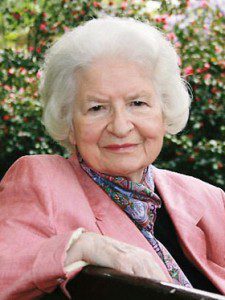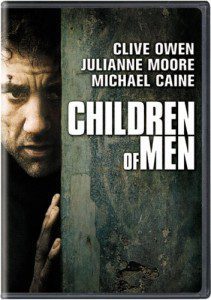 English writer P.D. James died yesterday at the age of 94. She told the BBC as late as last year that she was working on a new book.
English writer P.D. James died yesterday at the age of 94. She told the BBC as late as last year that she was working on a new book.
“I think while I am alive, I shall write,” she said. “There will be a time to stop writing but that will probably be when I come to a stop, too.”
James published 19 novels (and a handful of non-fiction works) and is mostly known as a mystery writer—a grittier, more literary descendent of Agatha Christie and Ngaio Marsh. Her Poirot was Adam Dalgliesh, a cordial bulldog of an investigator who wrote poetry in his spare time. Several Dalgliesh books are stashed away on my bookcases, veterans of many a trip to the mountains. It doesn’t feel like a vacation to me unless I have a P.D. James or Dick Francis book in tow.
 For our more film-centric purposes here, she also wrote Children of Men—the bloodiest, grimmest Nativity story ever. It is brilliant—a deeply Christian story, centered on an unwed, pregnant girl carrying the hope of a hopeless, childless world. It was made into a movie in 2006 (directed by Gravity’s Alfonso Cuarón and starring Clive Owen), and it continues to land on critics’ lists as one of the best movies of the 21st century.
For our more film-centric purposes here, she also wrote Children of Men—the bloodiest, grimmest Nativity story ever. It is brilliant—a deeply Christian story, centered on an unwed, pregnant girl carrying the hope of a hopeless, childless world. It was made into a movie in 2006 (directed by Gravity’s Alfonso Cuarón and starring Clive Owen), and it continues to land on critics’ lists as one of the best movies of the 21st century.
‘I wouldn’t be satisfied to think of it as a purely Christian novel, though,” she told The Independent of Children of Men. “What restores the world is love, commitment to another human being . . . But of course Christianity is the religion of love, despite its effects in the world, which have often been the opposite.”
For me, James was and is an inspiration. As a writer, of course: She published her first book when she was 42, the same age I was when I published mine. She worked in government service until 1979, giving hope to us wannabe authors who still have to collect a regular paycheck. But even more than that, I appreciated the sort of clear-eyed, kind-hearted person she was reported to be—and how her faith went hand-in-hand with her keen intellect, each bolstering the other. The Independent’s Jan Dalley interviewed James when Children of Men was first released. In her subsequent profile, Dalley wrote:
[James] uses unfashionable words like ‘truth’ and ‘moral responsibility’ quite unselfconsciously, and there is a quality about her which makes her listener accept them in the same way. And she has been, over the years since her celebrated crime novels began to attract huge attention, extraordinarily consistent: always a comfortable, rational, beautifully mannered person, who is as good and dutiful as an interviewee as she seems to be in other departments of her life.
James’ works, in their own way, were deeply moral. She had little interest in psychopathic murderers, but rather killers who might not be so different from us and whose motivations could be uncomfortably familiar. For her, the average whodunit became a deep rumination on crime and punishment, sin and justice. She believed in good and evil—things that transcended our paper-written rules and went deeper.
“Crime fiction confirms our belief, despite some evidence to the contrary, that we live in a rational, comprehensible, and moral universe,” she once said (as reported on BuzzFeed)
Life itself, of course, is something of a mystery, and religion is a means through which we investigate it. Each of us tries to figure out why we’re here before we go. We look for order and meaning in a universe that can feel chaotic, sometimes insane. And if we look hard and thoroughly enough, we can find it—in a book, in a movie, in our own lives. We find the fingerprints of God.













